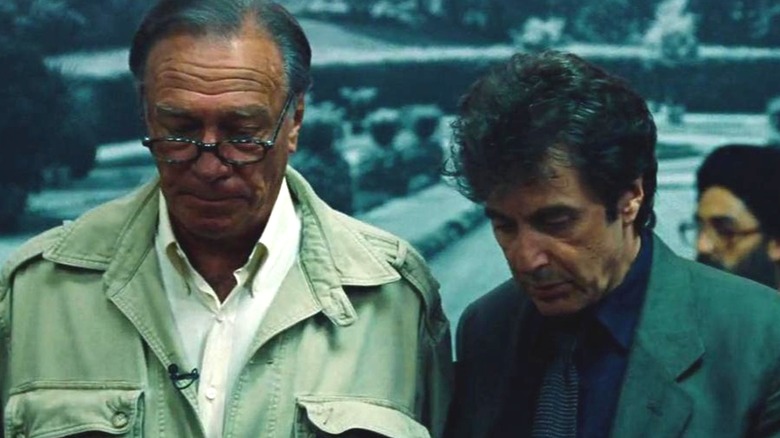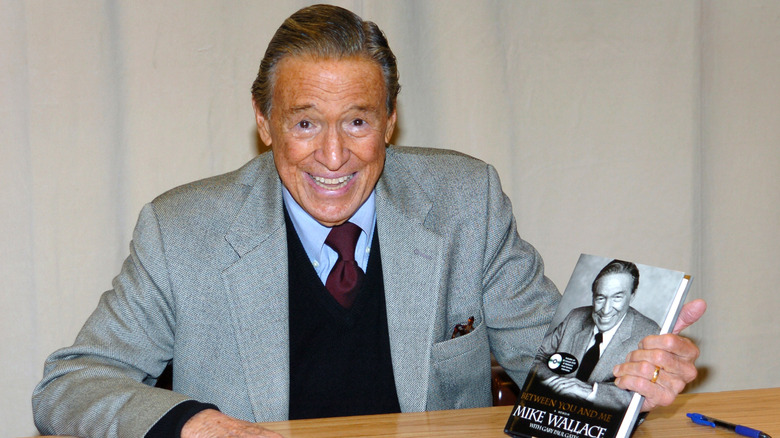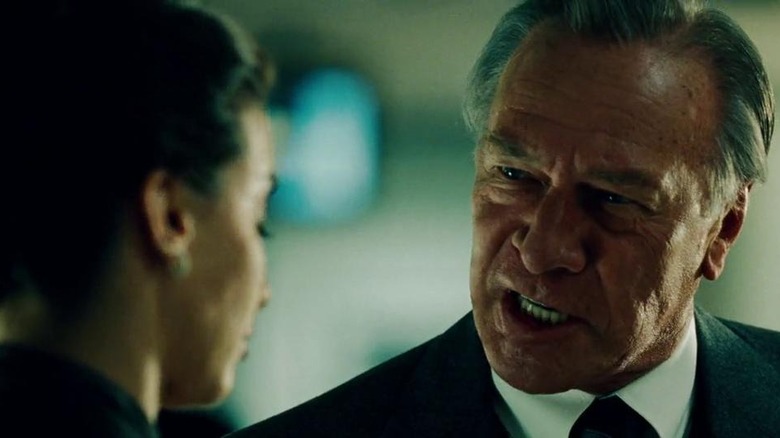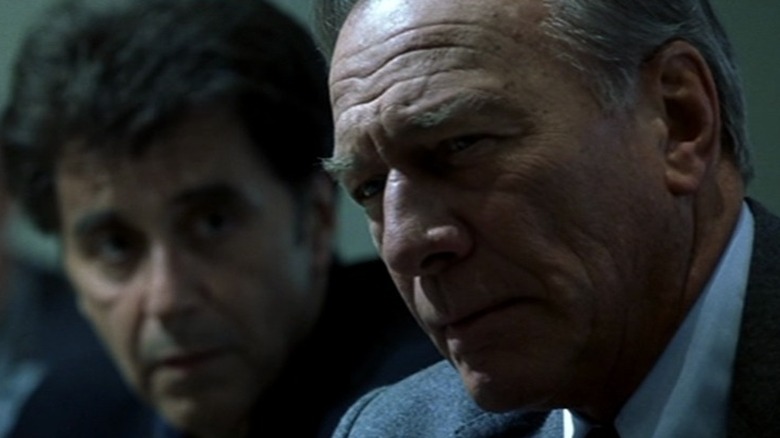One Of Michael Mann's Best Films Caused Real Life Distress
Director Michael Mann's magnum opus is 1995's "Heat." The movie's sprawling shoot-out scene (the best of its kind) is what many most remember about "Heat," but the picture doesn't only rely on action. "Heat" is just as compelling when Detective Vincent Hanna (Al Pacino) and robber Neil McCauley (Robert De Niro) are sitting down for a cup of coffee. Mann's next film, 1999's "The Insider," relies only on dialogue scenes to keep up the tension and easily succeeds.
"The Insider" is nearly as long as "Heat" (158 minutes, compared to 170 like "Heat") and is just as compelling despite there being no action scenes to break up the talky bits. Mann is one of our best action filmmakers, but his talents extend past action movies. (Read our full ranking of Mann's films here.)
A journalism thriller, "The Insider" recounts the story of a 1996 "60 Minutes" expose on the tobacco industry. (The story had previously been detailed by Vanity Fair writer Marie Brenner in her 1996 article "The Man Who Knew Too Much.") Mann reunited with Pacino, who plays "60 Minutes" Producer Lowell Bergman, and recruited a pre "Gladiator" Russell Crowe as Dr. Jeffrey Wigand, a dismissed Brown & Williamson chemist turned whistleblower. Christopher Plummer is third-billed as legendary "60 Minutes" host Mike Wallace.
"The Insider" got plenty of accolades — including a Best Picture nomination and Crowe's first Best Actor nomination. The real Mike Wallace, though, was not among the picture's fans. While speaking at Loyola Marymount University in 2014, Mann recounted that Wallace (who died in 2012), "['The Insider'] really upset him. He detested the film. I know it injured Wallace, and I feel bad that it injured him."
The Insider's depiction of Mike Wallace
Comparing "The Insider" to 1976's "All The President's Men" is easy but there's some differences. This time, Deep Throat gets made; Wigand's life unravels and he finds himself the target of harassment (e.g. he discovers a single bullet left in his mailbox one day). Likewise, CBS does not stand behind the story once legal pressure mounts; Bergman has to fight tooth and nail to get Wallace's interview with Wigand broadcast. "The Insider" is about how corporate interests often get in the way of proper reporting and to that end, its depiction of Wallace isn't totally rosy.
In "The Insider," Plummer's Wallace is initially less of a firebrand about the situation than Pacino's Bergman. He explains in a voice-trembling monologue how he's approaching the end of his life (which hits harder now that both Wallace and Plummer passed on) and considering his legacy: "History only remembers most what you did last. And should that be fronting a segment that allowed a tobacco giant to crash this network? Does it give someone at my time of life pause? Yeah."
That changes once CBS President Eric Kluster (Stephen Tobolowsky) and legal counsel Helen Caperelli (Gina Gershon) put out a vivisected public statement from Wallace. Enraged by the disrespect ("We work in the same corporation, but doesn't mean we work in the same profession") and finally fed up with them forcing journalistic malpractice, he backs Bergman.
What the other subjects thought of The Insider
The real Lowell Bergman, speaking to The Wrap in 2012 after Wallace passed, offered his thoughts on why his former colleague disliked "The Insider." Bergman claimed that it indeed probably had to do with how the film portrayed Wallace as "someone who initially or at different points chose not to stand up to management." That, and how it peeled back the curtain of TV news reporting:
"I think it was Mike's insecurity. He respected reporting and it bothered him that he was living off of other people's reporting. Look, my role, or anyone's role in network news, is to make the person on camera look good. You don't do that, you don't work there. The myth is that the person on camera has done all the reporting and knows every part of the story, but we know in the business that when they say this is Mike Wallace's story, that's not true. But we're never allowed to explain that to an audience."
As for the other people who were depicted in the movie; the real Jeffrey Wigand thinks that Crowe "really nailed" his performance. Former Mississippi Attorney General Michael Moore — who led a lawsuit against big tobacco and played himself in "The Insider" — also praised Mann's attention to detail. (According to Bergman, Mann also offered Wallace the chance to play himself, but Wallace skipped the meeting.)
Bergman, though bemused by how the movie was "the fictionalization of non-fiction," described "The Insider" as "emotionally, politically and, in general, dead-on accurate" to The Wrap.
The Insider reported on the world's most famous reporter
The film's accuracy includes Wallace's reticence about standing up to CBS' decisions, at least according to Bergman:
"From the beginning Mike was unwilling to commit himself to going to the line with this and with risking his job. In meetings with CBS' counsel, he didn't raise his voice, nor did ['60 Minutes' creator] Don Hewitt [played in "The Insider" by Philip Baker Hall]. Both were well known for browbeating people in private and public. They didn't say a word really in the meeting."
Bergman left "60 Minutes" in 1998 (the final shot of "The Insider" is Pacino-as-Bergman walking out of CBS). He worked as a consultant on "The Insider," and he said that his professional relationships with Hewitt and Wallace never recovered from that. (Hewitt said in 2000 that Bergman "should not be allowed 'within a hundred miles of a newsroom.”')
In 2001, when the story hadn't totally chilled, Bergman recalled:
"I tried once to talk and meet with Mike after he had gone public denouncing me because of his reading of the script [of The Insider]. I thought that we were beginning a civil conversation. The next thing I learned was that his version of the meeting was that I came on my hands and knees to his apartment in New York asking for my job back."
Speaking about Wallace's overall legacy to The Wrap, Bergman called him both "a pioneer" and "extremely difficult to deal with," yet praised him for his journalistic courage: "When it came down to it, if it was a tough piece, it was more likely than not that Mike would do it. He had balls."
Of course, Wallace should've known that an occupational hazard of journalism is that sometimes, your subject won't appreciate what you write.



